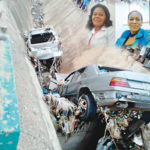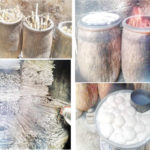
SOME few months back, residents of Plateau State had thought that peace was returning to the state after years of crises between herdsmen and locals, but by the turn of the year, things began to change for the worse again. The insecurity had continued, culminating in the killing of over 200 people, which invariably caused the already over-bloated Internally Displaced People (IDPs) camps in three major local government areas of the state to be further overstreched..
In Riyom, Barakin-Ladi and Jos South Local Government Areas, pain, agony, dejection and frustrations were written all over the faces those in the camps when Sunday Tribune visited. The inhabitants have all come to the camps seeking succour and relief which they ate yet to get.
There are over 35 IDPs camps scattered across the three affected local governments, with each of them hosting no fewer than 1,000 people. The atmosphere and conditions of the camps are terrible, horrible, obviously, and not fit for human habitation. Most of the people therein, at the time of visit, looked abandoned and lost. They were without basic facilities to cushion the harrowing experiences and trauma they are passing through.
Sunday Tribune discovered that that children in the camps, who are supposed to be in schools, are languishing with their parents. The camps don›t have designated centres they could learn. Even the makeshift ones created had been abandoned. Most of the children were playing around in the camps when Sunday Tribune visited..
Though organisations and philanthropists have been visiting the camps to assist the inhabitants through provision of basic amenities like clothes, toiletries, food items, among others, all the efforts are grossly inadequate to take care of the IDPs, whose number has continued to swell over time.
When Sunday Tribune visited the IDP camp at Geosciences in Jos South Local Government Area, it was overcrowded. The camp which under normal circumstance can barely host 500 people has over 1, 426 residents. Organisations such as Doctors Without Borders and men of the Red Cross were on ground to meet the health needs of the residents. The camp leader, Mr. Francies Chong told Sunday Tribune that the IDPs were not getting deserved and adequate attention from both the state and federal governments.
According to him, the food items and other things supplied by State Emergency Management Agency (SEMA) in conjunction with the National Emergency Management Agency (NEMA) were inadequate. He also revealed that the camp was allocated 60 bags of rice, 25 bags of corn, 24 belts and four bags of salt.
“Though some non-governmental agencies and individuals were here but all these [donated materials] put together are not enough to meet the needs of the people. There is shortage of sleeping materials and cooking utensils, among others,” he noted.
Going round the camp, Sunday Tribune saw many of the children wandering about the camp unattended to while two officials of Red Cross Society who tried to step in as teachers to keep the children busy could not control them due to their large number.
The camp leader, Chong, said «there are over 462 children in the camp» and that since the «State Universal basic Education Board (SUBEB) came to take a census of the children, it has not revisited the camp». He added that nutrition balance of the children is equally at its lowest.
“One woman was just delivered of a baby yesterday (Wednesday); the government promised mobile clinic, but we are yet to see one,” he stated, while underscoring the poor situation in the camp, praising the helpful interventions of the volunteer medical experts. “The Doctors without Borders have been wonderful,” he said.
Chong noted that the poor situation of the camp has forced some of the IDPs to move out, while others, especially farmers are planning to go back to their villages to continue with farming in spite of the danger to their lives.
At Hiepang camp, the displaced people are kept at Church of Christ in All Nations (COCIN). The conditions there, unfortunately, are more terrible than those of Jos South local government IDP camp. The church auditorium which shelters the displaced people was filled to capacity while the facilities at the church premises were overstretched.
The camp leader, Iliya Makaw, told Sunday Tribune that “there are over 2,000 people in the camp”. He added that the materials and food items brought by SEMA and NEMA were not enough to meet the needs of the people. The displaced inhabitants of the camp, he disclosed, lack sleeping materials, foodstuffs, among others.
“What SEMA gave us is not enough to meet our needs; quite a lot of people especially men sleep on the floor and in most cases outside, if there is no rainfall. We were given 200 mattresses, 80 blankets, 200 mats. The men just have to surrender these items to the women and children; even with this arrangement, it still cannot go round the women and children,” Makaw said..

“The government should help u; we want to go back to our respective villages. The government should provide adequate security for us to prevent further attacks,” he stated.
One of the displaced person, who identified himself as Jonathan Mamsawa, said most victims of the herdsmen attacks, especially the farmers, are willing and ready to go back but with the report of continued assault on their communities by the gunmen, this has not been possible.
“The information we got is that the Fulani are destroying our farms, still burning houses that are still standing and carting away our things,” Mamsawa said to explain why many of them are still enduring the hardship of the camp.
Mamsawa implored the government to provide building materials such as roofing sheets, cements and others to rebuild the burnt houses, noting that the people will be more comfortable with the Mobile Policemen than men of the Special Task Force to protect them whenever they return to their respective villages.
In all the IDPs camps visited, the story is the same. It is one of neglect and frustration. The Chairman Relief Committee set up by the Berom Educational and Cultural Organization (BECO) Hon. Simon Mwadkom, said the committee has written letters to both SEMA and NEMA on the conditions of the displaced people in all the camps, adding that the responses of the two agencies and the state government were nothing to write home about, considering the pathetic conditions of the people in the camps.
Mwadkom, who said the committee had visited virtually all the camps more than two times, said in most of them, there were no health workers on ground while efforts to organise makeshift classes for the children in such camps had failed.
“Most of the support we have received so far are coming from the NGOs, corporate organisations and individuals. We have intimated the appropriate authorities but their responses are not encouraging. Also, the government by now is also considering the possibility of resettling the IDPs but this can be possible if the government can provide adequate security for them and send the herdsmen packing in all the villages they have forcefully occupied. From all indications, our people are more comfortable with mobile policemen than the Special Task Force.
“Right now, the Fulani herdsmen are busy harvesting the crops of the displaced people and destroying their farms lands. So we are appealing to the government to provide the people with building materials to enable them to rebuild their houses and also put the education of the children into consideration,” Mwadkom said.
As of the time of filing this report, Sunday Tribune had made efforts to speak with officials of the Plateau State government on the situation at the IDP camps.
The acting Director of State Emergency Management Agency, who is also director of Administration, Mrs Roseline Dakwar declined comment. “I am presently on tour of the IDP camps, moreover I don’t know you, therefore I cannot grant you an interview on phone,” she said.
WATCH TOP VIDEOS FROM NIGERIAN TRIBUNE TV
- Relationship Hangout: Public vs Private Proposals – Which Truly Wins in Love?
- “No” Is a Complete Sentence: Why You Should Stop Feeling Guilty
- Relationship Hangout: Friendship Talk 2025 – How to Be a Good Friend & Big Questions on Friendship
- Police Overpower Armed Robbers in Ibadan After Fierce Struggle





